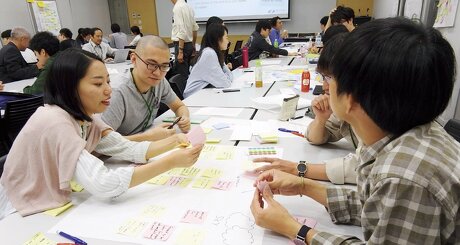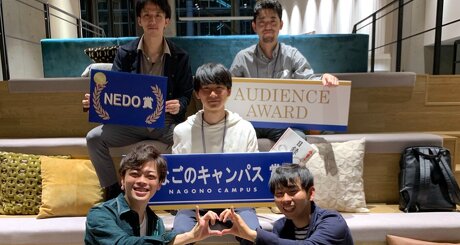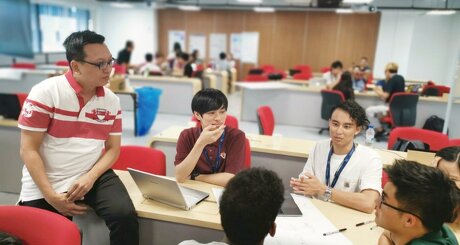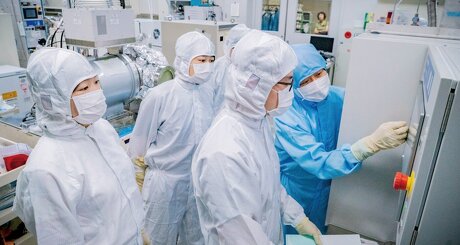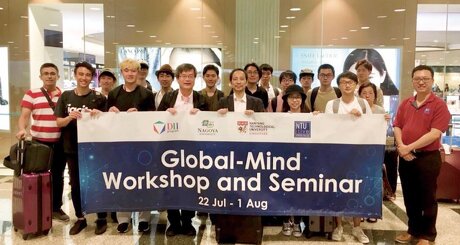Student Quality Assurance
Admission
The DII Collaborative Graduate Program for Accelerating Innovation in Future Electronics accepts students with a keen interest in manufacturing and products. More specifically, in addition to students with the basic academic skills necessary to achieve expertise as well as comprehensive knowledge, who explore and expand the frontiers of engineering, as stated in the admission policy of the Graduate School of Engineering, the following four items are added as qualifications for participating in the Program:
1) Students with a higher level of basic academic knowledge and capabilities
2) Students highly motivated and enthusiastic about exploring and practicing leading-edge engineering and its expansion into society
3) Students capable of discussing, disseminating or translating into practice the aforementioned in the international arena
4) Students who demonstrate initiative and independence in taking action
Applications are accepted around January from fourth-year undergraduate students who have taken the entrance examination for the Graduate School of Engineering. This is followed by the screening of applicants’ documents and interviews by the selection committee organized inside the Admission Office, for the decision on whether or not to pass an applicant. (Please note that for AY2018, the year the DII Collaborative Graduate Program was adopted, acceptance of applications and selection are exceptionally scheduled for October and November.) Applicants’ basic academic skills are judged based on their results in the graduate school entrance examination. In addition, to prepare the First-year Short-term Overseas Internship, whether or not an applicant has adequate (English) language proficiency is assessed according to the scores of external test(s) that he/she is required to submit at the time of screening the documents. Students whose language skills have proved insufficient will be sent to a language training course in order to improve their basic language skills.
Full-time adult students in doctoral courses with extensive experience of life and students who received higher education abroad play a valuable role in diversifying program student populations, thereby creating an environment that allows students to work hard together to improve themselves. While this is, in principle, an integrated five-year doctoral program, working adults holding a master’s degree and students who earned their master’s degree abroad may be accepted to join the program from their third year if they pass the screening in recognition of their experience and academic performance, as appropriate.
Qualifying Examination (QE)
Students undergo two QEs and completion judgment. Whether students meet the required standards is assessed according to the points uniquely set by the DII Collaborative Program, and using an evaluation axis consisting of three abilities: prescience and planning ability based on wide-ranging discernment; creativity and the ability to expand technology; and ingenuity and insight. The achievements of the students accumulated in the e-portfolio serve as the basis for such assessment. As requirements for completion of the Program, all program students must have finished the curricula common to all courses: Workshop for Human Society Problem Challenge, and Practical Training in Product Development. In addition, they are required to earn prescribed points from among DII Basic and Specialized Courses. Thereafter, the required points will be set according to the course selected. Students who have passed the completion judgment and earned the credits required for the degree are granted a doctorate in engineering with the name of the DII Collaborative Program added to the diploma. Students who have achieved particularly excellent results are given a commendation.
The first QE takes place upon completion of the second year. Achievements are presented at a retreat training camp with the participation of all program students and evaluated by the program staff members including those outside Nagoya University. As requirements relating to language skills, students must possess a certain level of English proficiency as proved by their scores in external test(s) in order to guarantee their eligibility for participation in the Long-term Internship scheduled for the third year. The second QE is held upon completion of the fourth year when results of the DII Collaborative Project are presented for evaluation by the program staff members, including those outside Nagoya University.
Students who fail the QE are allowed a certain period of time to continue to participate in the program. During the period, they are provided an opportunity to make another attempt, supported mainly by the Education Office for their return to pursue the program.


